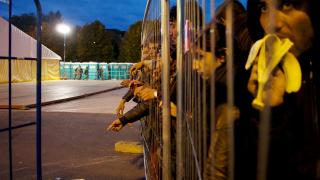
Multilateralism is stalling. Political populism is on the rise, with tribal instincts and nativism resurgent. These phenomena challenge our understanding of the potential – and capacity – of the current system of international relations, as well as of the internal legitimacy of even the most democratic nation states. Of particular interest is the propensity of political leaders to take recourse to ‘building walls’. In an age of post-truth politics and anger-fuelled populism, driven by dissatisfaction with the political status quo, internationalism is under threat.
The fall of the Berlin Wall was a beacon of positive change and of renewed hope – unleashing opportunities for social, economic and cultural reunification. But in the years since, around 40 countries have built physical barriers on their borders in an attempt to separate people, to cage people in, or to lock them out. A recent example is the razor wire fencing along Greece and Bulgaria’s land borders with Turkey, constructed in 2012 and 2015 respectively in an effort to deter refugees and migrants.
In 2016, a ‘wall-building’ policy of a different kind has defined key political events in Europe and the United States. Donald Trump’s promise to build a literal wall between Mexico and the US is one thing, but arguably more troubling is the sheer proliferation of rhetorical walls used by political figures to exploit and foster division and fear in pursuit of political objectives. More often than not, such language presents a misguided vision of what it means to be secure and prosperous in a complex and changing world.
The US election – and the EU referendum – captures the impact of simple but powerful messaging, which lacks nuance and inspires little empathy for those ‘others’, who are instead vilified in the process. In mature democracies which really ought to know better, anti-immigrant, anti-religious, anti-globalist and misogynistic sentiment has seeped into the mainstream. Post-truth politics is anything but new, but 2016 has seen new heights in the art of leveraging how people ‘feel’ in order to define problems or solutions.
The two campaigns, on two different continents, demonstrate how post-truth politics can not only win mainstream support, but how it can shift the parameters within which opposing viewpoints have to engage. It is more difficult to project pragmatic, evidence-based policy themes against strong, simplistic rhetoric, which is delivered with such certainty that it surely ‘must be true’. When a core simple message – for instance, “take our country back” or “make America great again” – resonates with how people feel, the alternative – however closer to an accurate portrayal of the truth – has the problem of appearing disingenuous, evasive and emotionally detached. It is perceived as the dishonest arguments of a political elite who are part of the problem and seeking to maintain a corrupt and illegitimate status quo.
The growth of post-truth politics is fuelled by modern technology. Mistruths and speculation are now formed and spread at warp speed. Digital and social media – on the one hand so liberating and capable of bringing people together – provide for the instantaneous diffusion of unchecked versions of the “truth” and, ultimately, emotional judgement.
The toxic environment in 2016 exists because the rhetorical walls speak to a profound sense of disappointment, disenfranchisement, and, above all, insecurity – all of which have been exploited by political opportunism. International cooperation is seen as part of the problem, rather than part of the solution, as domestic economic and societal inequalities are attributed to the ‘evil’ rise of globalism and the movement of people. Isolationism has also been fuelled by the diffuse threat of international terrorism, which pays little respect for state boundaries, as well as the erosion of trust in, and respect for, key institutions of state, economy and governance.
There is some legitimacy to this critique. We need to remain critical and pragmatic about the possibilities and pitfalls of international cooperation. But internationalists must hold firm to a positive message of what we can achieve when we break down barriers rather than build new ones. The most pressing issues facing our planet, like climate change or disarmament, can only truly be addressed when people work together. Walls, rhetorical or otherwise, neither sooth our insecurity nor slow the forces of globalism. They cast shadows. And in that darkness misery grows.
Photo: Asylum seekers in a camp on the border between Austria and Slovenia, 22 October 2016. Credit Michael Gubi/CC

